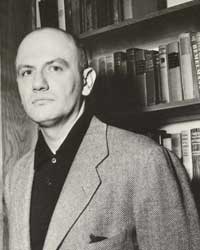
Berger has always been a bit of a mystery – although having a burgeoning literary career, he was a public figure only for a short time after the release of his first novel, Crazy in Berlin back in 1958. Soon after he became extremely reclusive, adamantly protecting his privacy to the extent that even his literary agent didn’t know how to contact him or where to find him for prolonged periods of time.
He left a vast and multi-lateral literary heritage. While the majority of writers choose a genre or literary trend and stick to it for the majority of their work, only occasionally allowing themselves to try something new, Berger was in the process of creative search his entire life, constantly dabbling into new and unexpected genres and turning almost every other work into an experiment for his own abilities and talents.
Throughout his literary career he wrote a satirical western novel (The Little Big Man), a horror novel (Killing Time), pulp detective story (Who Is Teddy Villanova?), science fiction (Adventures of the Artificial Woman), utopia (Regiment of Women), survival story (Robert Crews, a modification of Robinson Crusoe), variations on King Arthur’s legend and Greek tragedy (Arthur Rex: A Legendary Novel and Orrie’s Story), a number of Kafkaesque stories like The Houseguest, as well as multi-genre books that are not easily placed into any group.
While being dedicated to the idea of literature, Berger was mostly dismissive of modern literary scene and real life in general. In his interview with his friend Mr. Schikel he admitted that one of the main reasons he went into a self-imposed exile was the fact that he couldn’t stand real life around him and the only way to escape it was to go into fiction, which he did.
All in all Thomas Berger wrote 23 novels but, ironically, he is mostly known as the author of The Little Big Man which was adapted into a film in 1970. To this day his admirers consider the fact that Berger remained largely unknown to the American literary world to be one of the greatest losses American and world literature suffered in the last century.
Probably it was partly due to the fact that he wasn’t ready to promote his own creative work and loved his solitude too much to be bothered with such things as fame. He could have secured himself a place in American literary Olympus by receiving the Pulitzer prize, but he never rose higher than becoming a finalist back in 1984 – perhaps the public wasn’t much interested in a writer who wasn’t much interested in the public.
Berger’s death, however, is likely to increase the amount of attention his name gets – the Dial Press already plans a 50th-anniversary edition of The Little Big Man to be published this year.
